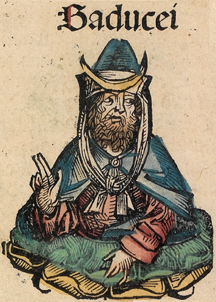I recently came across an apologetic website by an author named James Attebury. First, I want to encourage readers to check it out, as I believe it is a great blog for apologetics. Second, I came across an article titled, The Sadducees on the Old Testament Canon. In this post, I will be responding to some of the arguments Jmaes presents in his article. His original text will be in bolded black, and my responses will be in red below.
Attebury argues that the idea of the Sadducees rejecting all but the Torah is a misconception. He claims that both the Pharisees and the Sadducees accepted the full Hebrew Bible.
” …truth is that both groups believed that all of the Old Testament is canonical. This misunderstanding comes from the early church father Origen who taught that the Sadducees only accepted the Pentateuch. “
—This claim is not necessarily true, as the most substantial and undeniable piece of evidence— supported by Josephus, the New Testament, and the Church Fathers—is that the Sadducees rejected the resurrection.
As canon scholar Lee Martin McDonald writes, “The traditional view that the Sadducees recognized a smaller collection of scriptures (Pentateuch) than the Pharisees and Essenes is based largely on comments from Josephus and the New Testament texts that claim that the Sadducees rejected fate and belief in the resurrection or life beyond death (War 2:164–65; Ant. 18:16–17; Acts 23:6–8) and this can also be seen in Jesus’ reference to the Sadducees’ scripture, i.e., Moses or Law/Torah which does not speak of resurrection, saying that God is the God of the living and not of the dead (Mark 12:18–27).” (The Formation of The Biblical Canon Vol.1 Pg.252). Lets continue on.
Attebury argues that assuming the Sadducees held to a canon that consisted of only the Pentatuch is flawed. He writes, “With regard to their denial of the resurrection of the dead, it must also be kept in mind that they denied the existence of angels and spirits as well according to Acts 23:8. But the Pentateuch teaches the existence of angels in several places (Gen 32:1). If they rejected the Book of Daniel because it teaches the resurrection of the dead, then by the same logic they must have rejected the Pentateuch as well because it teaches the existence of angels. “
—The fact that the Sadducees rejected the resurrection and did not believe in angels is something we derive directly from Sacred Scripture (Acts 23:8). However, the author of this argument suggests that because the Torah mentions angels, the Sadducees must have accepted their existence—implying that their rejection of angels is somehow inconsistent.
But this reasoning is self-defeating. If we take Sacred Scripture as authoritative, then we already know the Sadducees denied angels, regardless of what the Torah says about them. The author’s argument essentially forces us to either reject Scripture’s testimony or concede that the Sadducees did, in fact, believe in angels—which we know is false.
Also, the claim that the Sadducees would have accepted the existence of angels simply because Genesis 32:1 mentions them fails to account for their own interpretative methods.
The Sadducees had a tendency to reinterpret or downplay scriptural references that did not align with their theological framework. A prime example of this is found in Sanhedrin 90b, where Gamaliel attempts to quote the resurrection from the Torah:
“The proof from the Torah is as it is written: “And the Lord said to Moses, behold, you shall lie with your fathers and arise” (Deuteronomy 31:16). The heretics [Sadducees] said to him: But perhaps the verse should be divided in a different manner, and it should be read: “Behold, you shall lie with your fathers, and this people will arise and stray after the foreign gods of the land.”
This demonstrates that their rejection of doctrines was not due to a lack of scriptural reference but due to their method of interpretation.
Attebury then argues that the Sadducees were theological liberals of the first century and that they prioritized the Pentateuch over other scriptures. He suggests that Jesus cited from the Torah rather than Daniel because, for Jews, the first five books were the primary source for establishing doctrine as they were authored by Moses. Since the Sadducees framed their argument using the Pentateuch, Attebury maintains that Jesus responded in kind, choosing a verse from Moses rather than from the Prophets to engage with them on their own terms.
—But this is not necessarily the case, if the Pentateuch were considered to be the most important for establishing doctrine, then, why did Jewish tradition develop doctrine using the Prophets and Writings? For example one could argue the messiah is in the Torah, yet it is only in the Prophets that the suffering servant is mentioned.
I would also push back here and say that Jerome’s point in his commentary on Matthew that Jesus could have used stronger scriptures to justify the resurrection shows even more clearly why Jesus chose to quote from the Torah: He’s showing the Sadducees they don’t understand their own scriptures.
Attebury argues that Josephus’ testimony in Against Apion (1.8) supports the idea that the Sadducees accepted all 39 books of the Old Testament. He points out that Josephus states all Jews esteemed the Hebrew scriptures, implying that the Sadducees, being Jewish, would have also recognized the full canon.
—This argument is an extreme overreach. It is highly questionable to claim that a single individual’s view represents what all Jews believed.
Applying this logic today, one could argue that all Christians accept the same Bible, which is demonstrably false. Such a broad generalization ignores historical realities, especially when we have first-century evidence to the contrary.
In addition to this, we have at least two sources that directly contradict Josephus’ enumeration of twenty-two books in Against Apion.
First, the Qumran community, as evidenced by the vast collection of the Dead Sea Scrolls, had a broader concept of sacred literature than Josephus’ limited count suggests. Their canon texts most likely included books like Jubilees and 1 Enoch, which were regarded as authoritative by at least some Jewish groups.
Second, the author of 4 Ezra, a late first-century Jewish text, refers to twenty-four public books and seventy secret ones, implying a much larger corpus of authoritative writings than Josephus’ claim.
These examples demonstrate that Jewish views on sacred scripture were not uniform, directly opposing the claim that all Jews, including the Sadducees, adhered to a fixed canon.
“Second, one of the arguments of the Sadducees against the resurrection was drawn from Job 7:9 (Tanhuma C.)”
—This argument presents a strikingly strong case against the Sadducees’ limited canon, but there are critical weaknesses that need to be addressed.
First, it is important to recognize that this account comes from a Pharisaic perspective, and nowhere does it explicitly state that the Sadducees considered Job to be canonical. The assumption that their use of Job in debate equates to an acceptance of its inspiration is unfounded.
Even if the Sadducees did not believe Job was divinely inspired, they could still reference it strategically to support their argument. Job 7:9 states, “He who goes down to the grave shall come up no more,” a verse that aligns with their rejection of the resurrection.
If they were debating the Pharisees—who did accept Job—it would make sense for them to counter their opponents using a text the Pharisees recognized. This rhetorical approach does not imply they considered Job scripture; rather, it demonstrates that they were engaging the Pharisees on their own terms. Ultimately, the passage in question does not establish that Job was part of the Sadducees’ canon, but it does reinforce the undisputed fact that they denied the resurrection.
As Lee Martin McDonald explains in his book (The Formation of the Biblical Canon, Vol.1 Pg. 256), “Had they held to the rest of the Jewish scriptures, how could they deny the belief in resurrection?” And this is the crucial point—if the Sadducees truly accepted the full Hebrew Bible, they would have had to confront its numerous affirmations of the resurrection. Their outright rejection of the doctrine strongly suggests they did not recognize those texts as authoritative. The argument that their citation of Job proves a broader canon simply does not hold up under scrutiny.
“Third, Micah 5:2 is cited by the chief priests and scribes in Matthew 2:4-6 and the priests would have been Sadducees. “
—The claim that the Sadducees exclusively cited Micah 5:2 in Matthew 2:4-6 is misleading. The text states: “So he assembled all the chief priests and scribes of the people and asked them where the Messiah would be born.”
This clearly indicates that both the chief priests, who were more than likely the Sadducees, and “scribes of the people” who very likely would have been the Pharisees were gathered, and “they said”—not “the Sadducees said”— showing a collective response rather than an exclusive Sadducean statement.
As Reinhard C. Kratz observes (Historical and Biblical Israel, p. 156), “the New Testament identifies four major Jewish groups: the priestly caste (Sadducees), the scribes and Torah teachers (Pharisees), the Zealots, and the disciples of Jesus. ” Given that the Pharisees accepted the Prophets as authoritative, it is far more likely that the scribes—rather than the Sadducees—were the ones citing Micah.
Moreover, quoting a prophetic text does not equate to canonical endorsement; it merely reflects the widespread cultural and interpretive recognition of such texts within the Jewish thought. Even if the Sadducees were involved in the citation, this does not prove they accepted Micah as canon.
Also note, if one is arguing for an agreed upon canon in the first century, then one must also acknowledge the weakness of this claim, here in this same chapter Matthew (2:23) appeals to a prophecy found nowhere in the Hebrew Bible, strongly suggesting that he is drawing from oral tradition rather than a fixed canon.
“Fourth, Jesus applies Daniel 7:13 to himself in Matthew 26:64-65 in front of the high priest who was a Sadducee. Why would Caiaphas get so angry about a verse he does not believe is canonical? “
—Even if Caiaphas, as a Sadducee, did not regard Daniel as canonical, his reaction to Jesus’ use of Daniel 7:13 was not dependent on its scriptural status but on its theological, political, and institutional implications. Jesus’s reference to the “Son of Man coming on the clouds” was a direct claim to divine authority, a concept deeply offensive to Jewish leaders regardless of their stance on Daniel.
In Jewish thought, riding the clouds was an exclusive function of God, something the high priest would have known from the Pharisee and Esceens, meaning that even if Caiaphas dismissed Daniel’s prophetic authority, he would have immediately recognized the blasphemous implications of Jesus’ words… a laim to divine status and judgment.
Furthermore, while it’s likely the Sadducees did not accept Daniel as scripture, they were still aware of its influence in Jewish eschatology, particularly among the Pharisees and Essenes, who saw it as messianic. Jesus invoking this passage would have carried weight regardless of its canonical status, especially as it directly challenged the priestly authority of the Sadducees, who controlled the temple and rejected apocalyptic expectations. Caiaphas’ outrage, then, was not about whether Daniel was canonical but about the threat Jesus posed to both Jewish theological traditions and the Sadducean power structure.
More importantly, Caiaphas was not the only figure involved in Jesus’ trial. The passage explicitly states:
“The chief priests and the whole Sanhedrin were looking for false testimony against Jesus so they could put Him to death.” (Matthew 26:59) . The Sanhedrin undoubtedly included both Pharisees and Sadducees, meaning the outrage over Jesus’ statement was not exclusively a Sadducean reaction. After the high priests asks Jesus the question, the text goes on to say:
“The high priest tore his robes and said, ‘He has blasphemed! Why do we still need witnesses? Look, now you’ve heard the blasphemy! What is your decision?’ They answered, ‘He deserves death!’” (Matthew 26:65-66)
The phrase “they answered” confirms that the condemnation came from the entire council, not just from Caiaphas. The Pharisees, who did accept Daniel as scripture, would have understood and reacted to Jesus’ words based on their own theological framework—not merely a Sadducean rejection of Daniel. This collective outrage shows that the reaction to Jesus was not about whether Daniel was canonical to the Sadducees but rather about His divine claim, which was offensive to all Jewish authorities present.
Attebury then asks why Caiaphas would ask Jesus if he was the Christ when the expectation for a future king from the line of David is not taught until after the time of Moses? This is a good question, but it has its problems.
—Caiaphas’ question about whether Jesus was the Messiah (Christ) is not evidence that the Sadducees accepted a Davidic messianic expectation as part of their theology. By the Second Temple period, messianic hopes— especially for a Davidic ruler—were widespread among the Jewish people, rooted in 2 Samuel
7:12-16, Psalm 2, and Psalm 110. While the Sadducees, who prioritized the Torah, may not have emphasized this belief, they could not ignore its political significance.
As John 11:48-50 shows, the chief priests feared that messianic claims would incite unrest and provoke Roman intervention. Caiaphas’ question was likely not an expression of personal theological curiosity but rather a legal and political trap—a way to elicit a dangerous claim from Jesus. If Jesus affirmed He was the Christ, it could be construed as treason against Rome; if He claimed divine authority, it would be blasphemy under Jewish law. Thus, Caiaphas did not need to personally believe in a Davidic Messiah to pose the question—he simply needed a charge that would justify Jesus’ condemnation.
And lastly, the Scriptures laid up in the temple over which the Sadducees had control included more than the Pentateuch (Antiquities 5.1.17).
The existence of stored texts does not equal a fixed, universally accepted canon.
Timothy Lim argues that the earlier Israelites did not use these stored texts as a standard for public piety, while Josephus is simply saying that by his time, multiple books were in the Temple archives.
“Put simply, there were scriptural scrolls deposited in the Temple but no public canon. The book of the law found in the Temple storeroom during Josiah’s reign was a book of reform. It was inaccessible to the public and did not serve as the standard of piety for all Israelites. According to Rabbinic literature, the scrolls kept at the Temple served an authoritative function in establishing textual readings, but this role is not the same as canonization.” (The Formation of The Jewish Canon Pg. 85).
*This article contains excerpts from James Attebury’s blog post, “The Sadducees on the Old Testament Canon” used under fair use for the purposes of critique, commentary and discussion. The original article can be found at The Sadducees on the Old Testament Canon. This blog is non-commercial and does not seek to profit from this content”.



